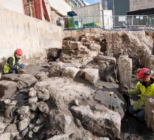Jeremy Hunt has presented his first budget today as Chancellor of the Exchequer, with announcements affecting the museums, galleries and heritage sector, including extended tax relief for museums and galleries, a brief mention of addressing public sector pay, and financial support for charities.
Extended tax relief for museums and galleries
Announced today is the extension of tax relief for theatres, museums and galleries, which will stay at rates of 45%-50%. It will be extended for a further two years until 2025, as Hunt said “our theatres, orchestras and museums do such a brilliant job at attracting tourists to London and the UK”.
Tax reliefs for Theatres, Orchestras, and Museums & Galleries have been extended for a further two years – announced in today’s spring budget
This will help sectors continue to compete globally and contribute significantly to the UK economy https://t.co/eOOOF7Lpez
— Department for Culture, Media and Sport (@DCMS) March 15, 2023
A DCMS tweet focussed on the entertainment industry, saying the extended tax relief will “help businesses to keep investing in high quality productions.”
Levelling-Up Fund
A third round of the Levelling Up Fund was mentioned, which will follow the announcement of the successful heritage and museums bids in round two, made earlier this year.
Hunt also said new £400m Levelling Up Partnerships would go toward “areas that include Redcar and Cleveland, Blackburn, Oldham, Rochdale, Mansfield, South Tyneside, and Bassetlaw.”
A £200m investment will be put toward local regeneration projects across England including Marsden New Mills Redevelopment Scheme, which will see the regeneration of the former textile mill complex into housing.
Addressing public sector pay
Hunt briefly addressed the continuing public sector strikes over pay, as a national strikes took place and rallies began in major cities during the announcement. The strikes and picket lines have affected museums across the country today, with some forced to close today.
Hunt blamed the industrial action on inflation, calling it “the root cause of the strikes”. He said the government will “continue to work hard to settle these disputes but only in a way that does not fuel inflation.”
Third-sector organisations to receive £100m
Hunt said: “I have also heard from my RHF the charities minister and his Secretary of State about the brilliant work third sector organisations are doing to help people struggling in tough times.
“They can often reach people in need that central or local government cannot, so I will give his department £100m to support thousands of local charities and community organisations to do their fantastic work.”
Twelve new investment zones
A plan for twelve new ‘investment zones’ across the UK were announced, with potential for these zones in the West Midlands, Greater Manchester, the Northeast, South Yorkshire, West Yorkshire, East Midlands, Teesside and Liverpool, and one in Scotland, Wales and Northern Ireland.
Hunt referenced Liverpool Docks, home of Tate Liverpool, the International Slavery Museum, Merseyside Maritime Museum, and The Beatles Story as a successful regeneration project, alongside Canary Wharf. He said the investment zones, which are yet to be decided, are hoped to become “twelve potential Canary Wharfs”.
The investment zones will be led by partnerships between local authorities, universities and businesses. To be selected, these areas will need to identify a location “where they can offer a bold and imaginative partnership between local government and a university or research institute in a way that catalyses new innovation clusters,” he said.
If the application is successful, the zones will have access to £80m of support for a range of interventions including skills, infrastructure, tax reliefs and business rates retention, he said.










